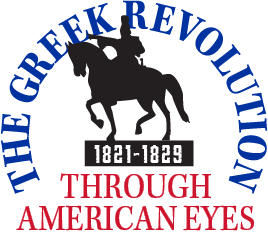III. “Greek Fire” The Grass Roots Response A. Expression of Public Support for the Greek Cause
A9. Report of a Meeting Held in Philedelphia "to express the sympathy of the citizens for their Christian bretheren the Greeks"
Niles' Weekly Register December 20,1823
THE GREEKS. A very large meeting of the citizens of Philadelphia was held in the Masonic Hall, on the 11th inst. to consider what measures were proper to be adopted to express the sympathy of the citizens for their Christian brethren the Greeks, heroically struggling for their lives, liberties and religion, against the grinding tyranny of the ferocious disciples of Mahomet — when the venerable bishop White was called to the chair, and Mr. Matthew Carey appointed secretary.
The chairman opened the meeting by the following address:
Gentlemen-
Before you proceed to business, I beg leave to say a few words, explanatory of my motive in accepting the honor conferred on me, by constituting me your chairman on this occasion.
I am not so sanguine as to imagine that the measure, contemplated by the call of this meeting, can have considerable effect in the cause of the oppressed Greeks, any further than by showing the public feeling to be in unison with what the president of the United States has affirmed in his late message, that they have “the good wishes of the whole civilized world.” This, itself, coming to them from a country so remote, and from a nation rising on the scale of political importance, can not but be a gratification and an encouragement.
On receiving a personal invitation to this meeting, it occurred to me, as a serious question, how far the intended measure, if it should pervade the union, may indicate a popular state of mind-tending to the dreadful calamity of war. On a consideration of the question, there appeared to me no danger of such a result, unless it should arise from the prosecution of the avowed designs of certain princes, who, by a strange misnomer, have called themselves “the Holy Alliance.” Should they, for the realizing of their project, attempt the subjugation of any people, when it might probably be a prelude to an attack on the sovereignty and the independence of the United States, I am not prepared to say, that, in such a case, war, on our part, would be either unjust or unwise. No such case exists at present. In the meantime, we shall be safe in the tract marked out by the president in his message, with which there is no inconsistency in the object of the present meeting. To the sentiments now delivered, there is not attached any importance, except so far as they may serve to reconcile the conduct of the deliverer of them with his official character.
The address from the Messenian senate to the citizens of the United States was then read, after which, sundry resolutions were passed-one appointing a committee to draft a petition that congress may take into consideration the expediency of recognizing the independence of the Greeks, the rest of the proceedings had reference to the supply of funds, by voluntary contributions, for the aid and relief of that suffering people.
At a stated meeting of the select and common councils of Philadelphia, held on Thursday evening, the following resolution was adopted unanimously:
Whereas, from the institutions of ancient Greece we have derived the first example of republican government, and its effect in promoting the happiness of the human race; and we continue to cherish in kind remembrance, our obligations for the knowledge derived from their statesmen, heroes and philosophers, in the arts, in arms and in policy:
Resolved, That these councils do now adjourn in order that the members may individually have an opportunity to attend the meeting this evening, called on behalf of the Greeks, to whose cause we are attached by the double tie of religion and gratitude.
(Hatzidimitriou 154-155)
Source: Constantine G. Hatzidimitriou, Founded on Freedom and Virtue: Documents Illustrating the Impact in the United States of the Greek War of Independence, 1821-1829 (New Rochelle, New York: Aristide D. Caratzas, 2002).
